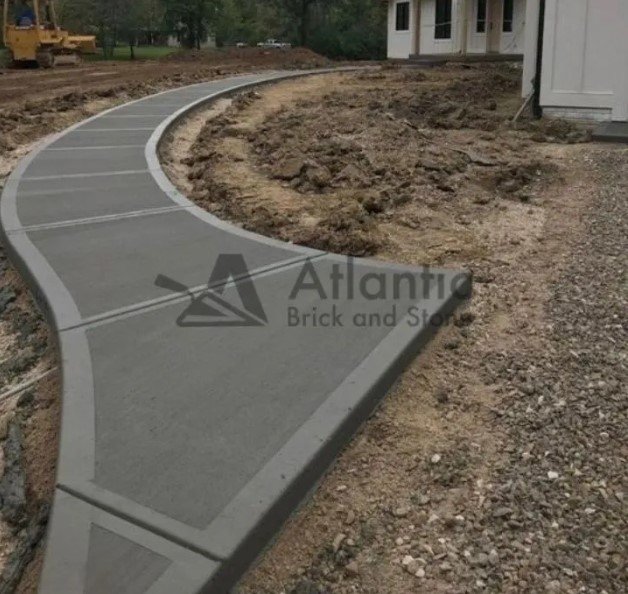Determining the proper thickness is one of the most important decisions you’ll need to make installing a new concrete walkway. The thickness of your concrete walkway will have a significant impact on its structural integrity, durability, and overall lifespan. So, it’s crucial to choose wisely. While a standard 4-inch thickness is usually recommended for most residential applications, there are some key factors you should consider to ensure your sidewalk lasts for years.

As with any concrete slab, the thickness directly influences the structural strength and stability of your walkway. Concrete provides robust support, but only if it is thick enough. Think about it like a wooden fence—a few thin boards won’t stand up to weathering and use nearly as well as a structure with substantive beams and posts. Similarly, too thin of a concrete slab risk cracking or crumbling more easily over time. Proper thickness also plays a key role in preventing cracks and ensuring your sidewalk can support foot traffic without buckling or settling unevenly. Considering average foot traffic and climate conditions will help guarantee its long-lasting endurance.
If you skimp on thickness, it can negatively impact your walkway in several ways:
An industry standard thickness for most residential walkways is 4 inches. This allows for ample structural integrity while balancing material needs and costs for light-duty home applications. Most building codes officially stipulate this minimum. Commercial standards often recommend 5-6 inches due to heavier foot and wheeled vehicle traffic loads.
When determining your project’s ideal thickness, carefully evaluate:
Beyond thickness alone, some additional techniques can boost quality and service life:
Since every site presents unique conditions, discussing your project specifics with local hardscape installation professionals can help validate thickness recommendations tailored accurately for your property’s needs and future uses. Don’t simply default to minimum standards without considering coming decades of demands. With the right thickness supported by quality materials and workmanship, your new concrete walkway can provide attractive, durable, and safe service for many years.
When planning your new concrete walkway project in Fredericton, consider the proven professionals at Atlantic Brick and Stone. As the premier hardscape contractor serving the area for 15+ years, we have developed a well-deserved reputation for their high-quality craftsmanship. Our masons are experts in all aspects of walkway installation, from soil preparation and subbase compaction to precision concrete placement, reinforcement tactics, and aesthetic surface finishes.
Atlantic Brick and Stone also stands behind our work with an industry-leading warranty. Contact us to discuss your unique property needs and schedule an on-site estimate for a durable, attractive walkway that will enhance your home’s curb appeal and function for longer time.
Carefully evaluating factors like expected loads, drainage, climate risks, and subgrade issues will point you toward the optimum concrete pour thickness. While 4 inches normally suffices for light residential traffic, augmenting reinforcement or selecting an engineered thicker alternative brings greater rewards in reduced future cracking and maintenance demands, ensuring a solid long-term investment. By matching your concrete pour to your site specifics and caring for it properly thereafter, you can feel confident in a sidewalk that withstands both daily use and seasonal variability safely and attractively for its entire design lifespan.
For most residential walkways carrying limited loads, rebar reinforcement is usually unnecessary if following minimum thickness guidelines. However, very thick concrete, commercial applications, or extreme climates may still warrant steel reinforcement placement within the pour for added crack resistance.
At only 2 inches, the concrete would be too thin structurally to withstand weather fluctuations without premature cracking or structural failure. The standard minimum thickness of 4 inches provides a safe, long-lasting surface for light pedestrian traffic in most residential applications.
GET STARTED
Create stunning structures with our residential and commercial masonry services in Fredericton. From meticulous designs to the completed build, our process is professional and rewarding, and we can’t wait to build your dream with you.
Atlantic Brick and Stone, one of the best masonry contractors in Fredericton, NB
Contact
8 Muskie Street, Lower Kingsclear, New Brunswick E3E 0E7, Canada